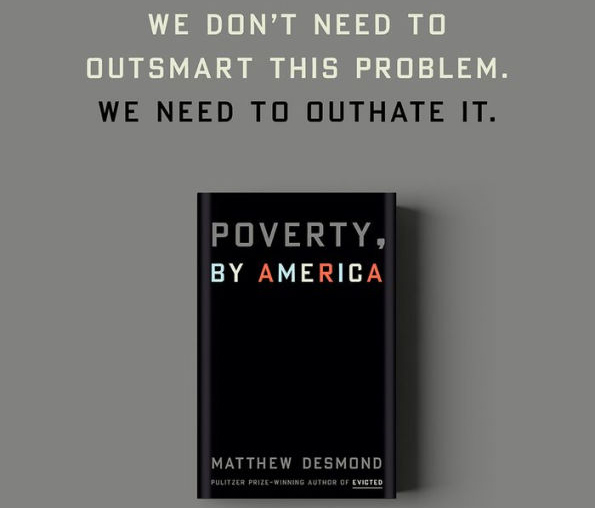
One in nine Americans live in poverty, and millions more live somewhere between precarity and true security. A new book argues, though, that it doesn't have to be this way — and that we can all play a role in challenging the systems and individual choices that "keep poor people poor" for benefit for everyone else.
On this episode of The Brake, host Kea Wilson sits down with Pulitzer Prize-winning author Matthew Desmond to talk about his new book Poverty, by America, the poverty abolition movement, and how it intersects with the movement to end car dependency. (Hint: it's not just about hefty monthly car payments.)
Hear it below, on Apple Podcasts, or anywhere else you listen, and buy your copy of Poverty, by America anywhere books are sold.
The following excerpt has been edited for clarity and length.
Kea Wilson: I want to go ahead and just dive in with the elevator pitch. Tell me in a few words, what is Poverty, by America about? And why should every sustainable transportation advocate in America read it?
Matthew Desmond: There's a line in Tommy Orange's book, There, There, and it goes like this: "These kids are jumping out of the windows and burning buildings falling to their deaths, and we think that the problem is that they're jumping."
And when I read that, it really hit me. I feel like the poverty debate for the last 100 years has focused on the poor — the jumpers. This book is about the fire. It's about who lit it, and who's warming their hands by it. So that's the elevator pitch for this book.
As for why every person in America including those that are obsessed with public transportation should read it? Because a lot of us are complicit in all this poverty. There's so much poverty in this country, not in spite of our wealth, but because of it. Many of us are connected to this problem. And we're connected to the solution.
KW: We absolutely are. I learned some of the ways that I'm connected to this solution through your last book, Evicted, which I and pretty much every other urbanism-adjacent person in the United States probably read and loved. And it taught me how powerfully things like the mortgage interest deduction — stuff I thought of as banal — were really forms of welfare for people who are well above the poverty line, and how those incentives influence who is getting rich off of housing in the United States, and who ends up unhoused or at least in a state of really perilous insecurity. I'm curious: is there an analogue to those types of forces in the transportation world? Or, to paraphrase one of your chapter titles, how do we force the poor to pay more for basic mobility, while we provide a smoother path for the rich to get around?
MD: Yeah, one of the things that I think about a lot when it comes to transportation is this dynamic we call "private opulence and public poverty." It's an old saying goes back to the Roman historians, actually. But it was popularized by the mid-century economist John Kenneth Galbraith in his book, The Affluent Society. It's a dynamic that emerges when a lot of rich folks live alongside a lot of poor folks, and [simply by witnessing the challenges of poverty], the rich are incentivized to withdraw even further from the public sector. We used to want to be free of bosses in America; now we want to be free of bus drivers.
And in that dynamic ... public transportation is used increasingly, and sometimes exclusively, by poor folks. And because of that, the public sector begins to crumble. We can see this in major cities, where the public transportation infrastructure is really in a bad shape, because it's only used by the most disadvantaged folks in that community. If all of us had skin in that game — if all of us were riding that bus, or depending on that bus to get to work or to get to childcare — I think that bus would be a lot better funded than it is today.
KW: Is exclusionary zoning another example of the ways that we calcify that dynamic of public squalor and private opulence that you're talking about? That has so many many connections to what we talk about at Streetsblog all the time, about why you can't walk to the grocery store, even if you happen to be a little bit wealthier. you make the case in the book that one way we can empower the poor is just to give them more choices about where they live and how they get around. Is zoning reform an example of that kind of empowerment?
MD: It is an example, yeah. There's probably no more soulless phrase in the English language than "municipal zoning ordinance." But it's a really good way to see the soul of a community. So many of us build walls around our neighborhoods, and we hoard opportunities behind those walls. And that creates concentrations of affluence, but also concentrations of poverty, and as a side effect, a lot of stockpiled opportunity.
But as your question alluded to, it also creates communities where a lot of us aren't really happier. We experience phenomenon of bored affluence. We experience loneliness. And so one of the calls that the book makes is not only to tear down the wall to promote broad prosperity, but also to promote cooler communities — communities with with more happiness, more interaction, more freedom.






